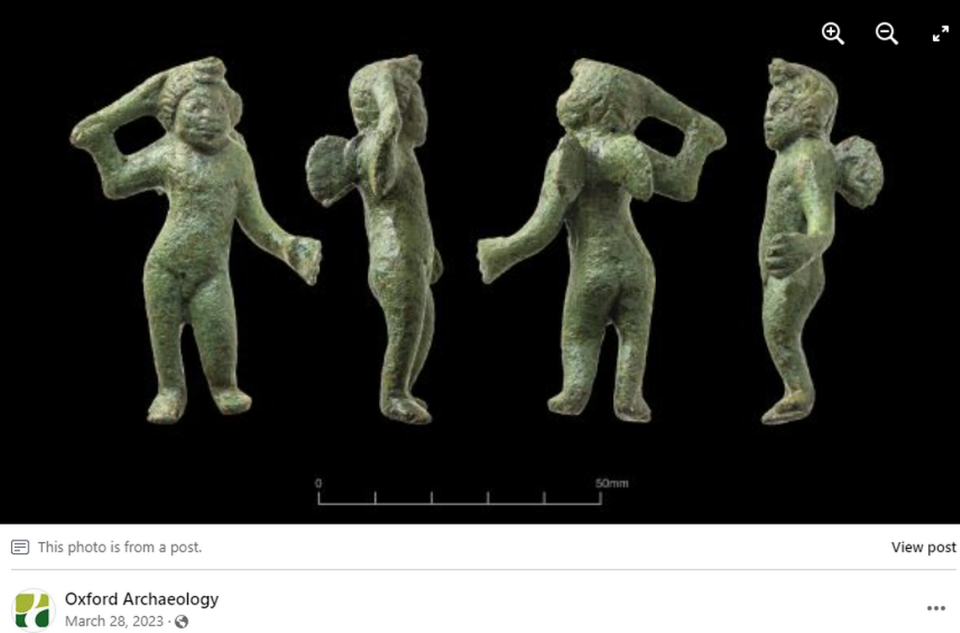Ancient Roman figurine — a symbol of love — discovered among artifacts in UK. See it
When you plunge a shovel into the ground in the United Kingdom, there is a chance you will uncover a bit of ancient history.
And when you’re completing a 3-mile-long highway extension project in the English countryside, the potential for discovery increases exponentially.
That is what happened as construction began on the A417 Missing Link project outside Gloucestershire last year, according to a May 7 news release from National Highways.
The project, first launched in 2019, broke ground in February 2023 to connect the A417 highway bypass to the Cowley roundabout, a section of road that is currently a single-lane carriageway that slows traffic, transportation officials said.
Before long, the archaeology team working with government agencies started to find artifacts dating as far back as the Mesolithic period, which began in the area around 12,000 years ago, officials said.
“Excavating an area of (3,821,188 square feet), the team of more than 60 archaeologists and 50 office-based specialists have spent more than 100,000 working hours carefully excavating and curating over 10,600 artifacts, weighing in at (220 pounds), that will be carefully preserved for future generations,” according to the release.
Pottery, coins and jewelry, along with other artifacts, have been found from the Mesolithic, Neolithic, Bronze Age, Iron Age, Roman Period and World War II, officials said.
One of the first pieces was a symbol of love.
“Before work began in earnest, trial trenching uncovered a Roman Cupid figurine and brooch, along with a Roman or early Saxon skeleton,” officials said.
A photo of the figurine was shared by Oxford Archaeology, a private partner working on the project.

Uncover more archaeological finds
What are we learning about the past? Here are three of our most eye-catching archaeology stories from the past week.
→ Massive 2,200-year-old tomb with grand interior unearthed in China
→1,000-year-old weapon — the first of its kind — found sticking out of grave in Spain
→ Workers unearth steelworks at medieval castle in UK — and find someone's 'hidey-hole'
Long before images of baby Cupid holding a bow and arrow adorned Valentine’s Day cards and boxes of chocolate, the ancient Romans worshipped Cupid as a god of love, according to Brandeis University professor and chair of the department of classical studies Joel Christensen.
The Greek version, small winged gods called Erotes, were commonly represented in a set of three, representing lust, desire and passion, Christensen wrote.
But Cupid, coming from the Latin verb cupere meaning desire, love or lust, was more a depiction of internal contradictions, according to Christensen.
Appearing as an often chubby baby but holding a deadly weapon, the bow and arrow, Cupid was the child of Venus, the goddess of love, and Mars, the god of war, representing the conflict of desire, Christensen wrote.
“Gloucestershire and the Cotswolds have a rich cultural heritage, and the team will bring their expertise to bear in adding to that history,” A417 project director Steve Foxley said in the release. “These discoveries will contribute significantly to our understanding of how people in the past adapted to changing environmental conditions, and we will ensure the remains are preserved and recorded.”
The archaeological finds, including the Cupid figurine, are part of the new series “Digging for Britain” on BBC Two, officials said, and will be available for the public to view on Saturday, May 11.
Gloucester in central-western England, about a 115-mile drive northwest from London.
‘Exceptionally rare’ painting — dating back 300 years — found in plain sight in the UK
Medieval treasure — belonging to legendary scammer — discovered in Poland mountains
Ancient images — painted inside shells — recreated for first time in China. Take a look
Rare golden artifacts stolen from UK museum. Suspects on scooters sought by police

